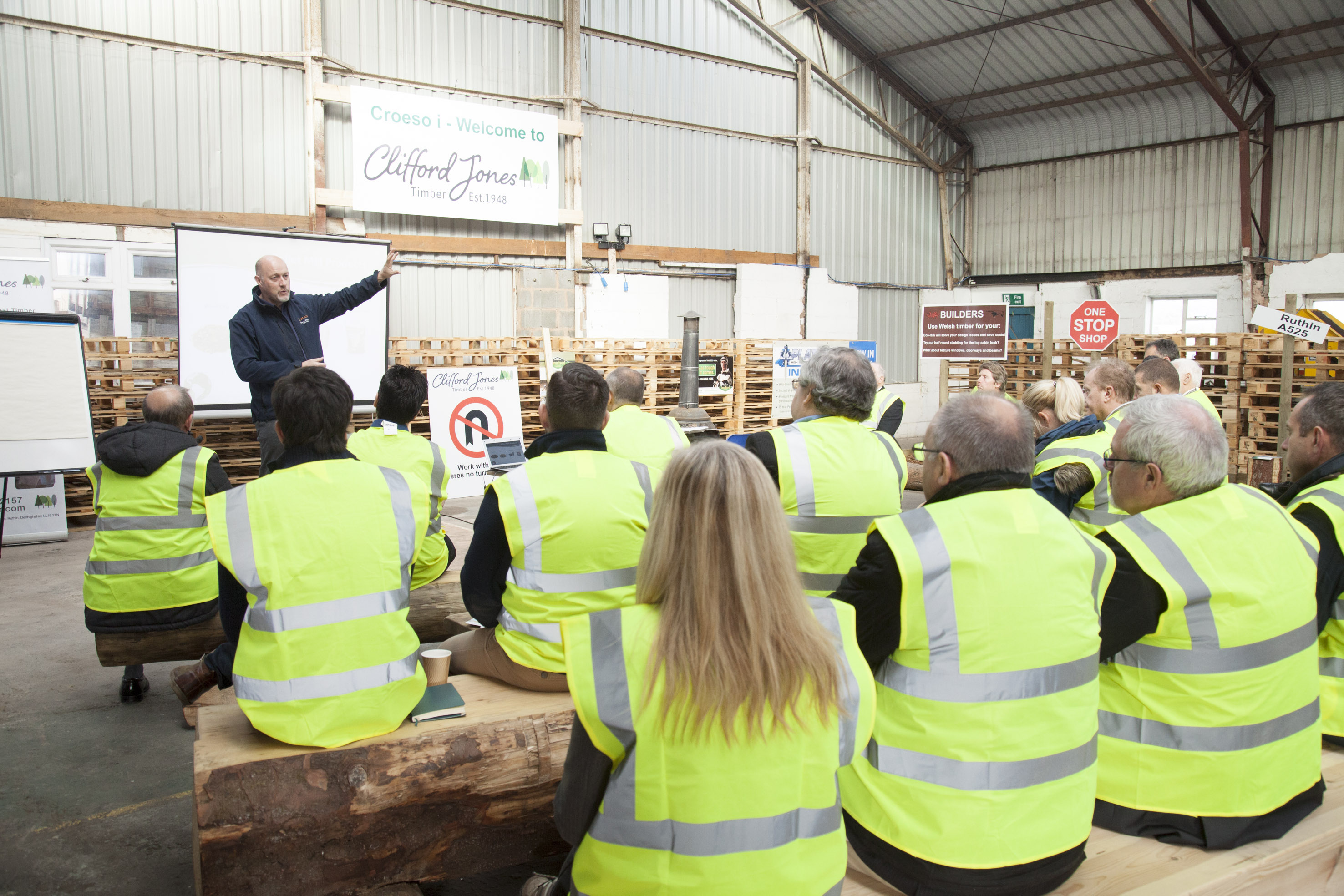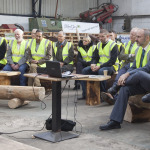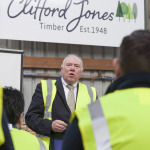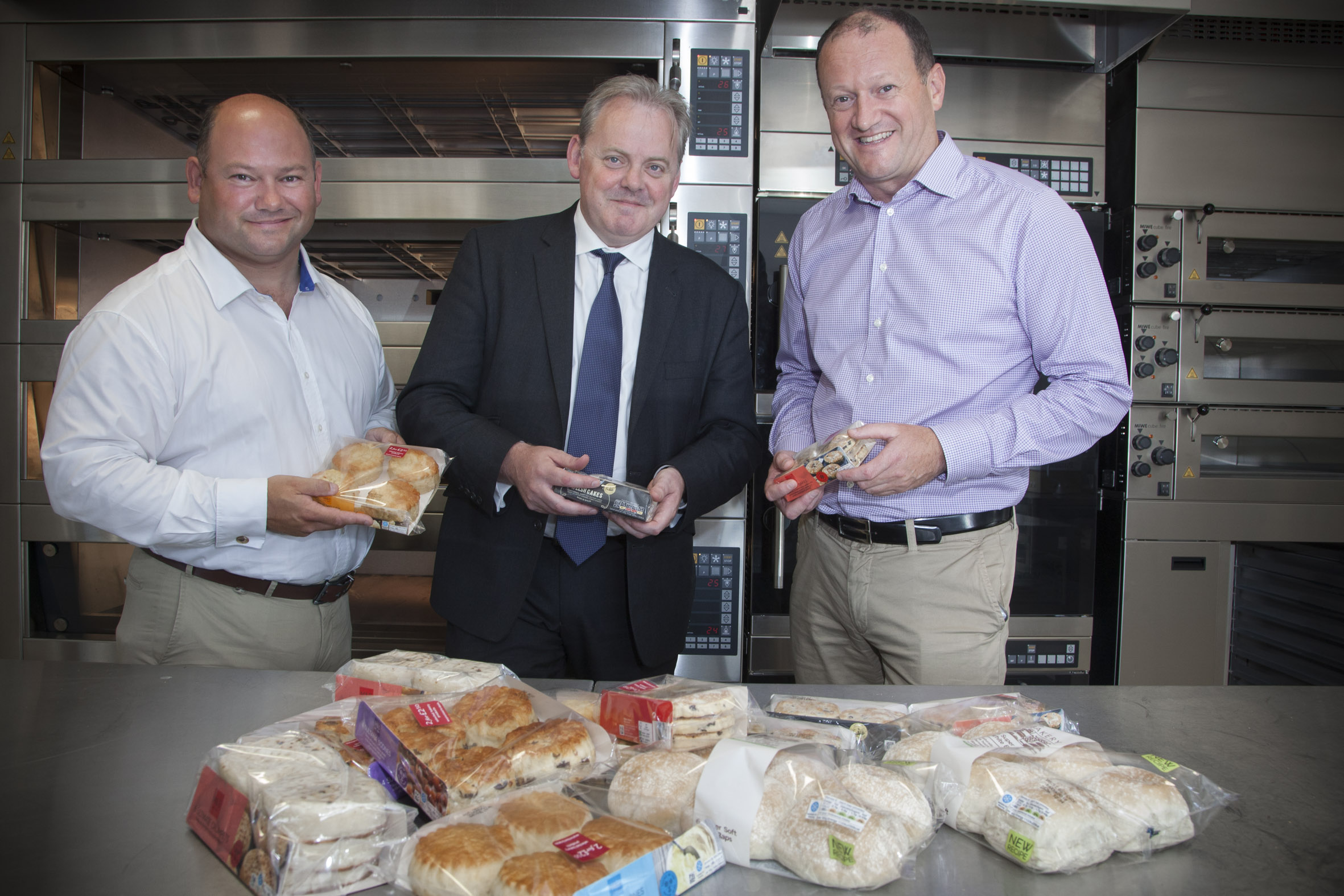A top timber business has been praised for its zero waste policy after a visit by business leaders from across Wales.
Wood products giants Clifford Jones Timber, one of the UK’s ‘greenest’ companies, hosted a ‘Waste Not, Want Not’ themed event attended by over 30 directors and senior managers from firms across Wales.
It was set up by the Inside Welsh Industry organisation as part of a Welsh Government-sponsored programme of visits to top companies in Wales aiming to showcase how they operate and share the secrets of their success.
They were given a tour of the company’s headquarters in Ruthin and a chance to see the processes which turn 100,000 tons of raw wood into fence posts, laminated timber for the construction and leisure industries, fuel logs, gates and garden furniture with the residue going to make over 25,000 tons of pellets and briquettes for everything from biomass to barbecues.
Clifford Jones Timber Management Consultant Keith Corbett outlined the company’s ethos and said: “Nothing leaves this site without an invoice.
“We are always looking to add value, for example with our new line of longer lasting fence posts, while also addressing not only the question of what to do with residues, but also how to make money from them.
“Every single thing is used. That’s part of our sustainability culture that includes using sustainable timber from Welsh and Scottish FSC-certified forests.
“We want to stimulate ideas about how businesses can make full use of the raw materials they process and find alternative uses for them and the waste they produce.”
He even took to the keyboard to illustrate their innovative approach by demonstrating how the same series of identical notes could be used in such diverse pieces of music as Johan Strauss’s Blue Danube waltz and Elton John’s up-tempo Crocodile Rock.
Presentations were also given by Clifford Jones Timber development chief Professor Derek Palmer, inventor of amoxicillin and cold water washing additive, and Phil Wildbur, of Blazers Wood Fuels which gets over 40,000 tons a year of its raw material from its neighbour, Clifford Jones Timber.
The audience of invitees were seated at benches and tables made from logs with heating supplied by wood-burners while the burgers they were served were cooked on wood fires.
IWI Programme Manager Bill Jones said: “It’s been different, quirky and very good and very well attended and those here have been very interested in the breadth of what they’ve seen.
“The whole story of what they are doing here and with Blazers is about the future and it’s about innovation and sustainability.
“Clifford Jones Timber are market leaders and they’re always doing something different so it’s been a real eye opener for those attending.”
Among them was Stephen Downey, Managing Director of Deeside-based fork lift truck specialists Hannaman Material Handling, and he said: “It’s been a brilliant event and very interesting.
“I’ve been here before and it’s so good to see how they have developed the business over the last couple of years. We can all learn from that.”
Kim Worrall, Sales Executive at PRS Telecom in Mold, said: “I have a passion for manufacturing and found the facility tour particularly interesting.
“It’s great that local businesses are doing everything to prevent unnecessary waste and using all waste materials to be reproduced into meaningful and useful products.”
Richard Jones, Chairman of Clifford Jones Timber, said: “We believe in recycling and we’re always looking at ways in which we can diversify.
“We use timber from sustainable forests and we aim to make the most of it because it makes good business sense and it makes sense for the planet as well.”
Clifford Jones Timber, founded in 1948, are the UK’s biggest manufacturer of wooden fence posts, producing over two and a half million a year, and they use 100,000 tons of timber annually.
They sold their briquette and pellet-making business last year to Blazers Wood Fuels but continue to supply them with 900 tons of residues produced each week from their sites in Ruthin and at Hunter Wilson in Gretna, in the Scottish Borders.
They kiln dry timber to improve preservative penetration on its treated timber, using on-site kilns powered by their own wood fuel, and sell kiln-dried logs – the offcuts from the fence posts.
For more on Clifford Jones Timber go to http://www.cjtimber.com/















